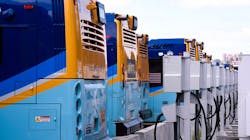FTA awards $409.3 million to bus and bus facility projects
The Federal Transit Administration (FTA) awarded 70 projects in 39 states a combined $409.3 million through the Grants for Buses and Bus Facilities Program. The grant program supports communities in the U.S. with funds to purchase buses and related equipment to construct bus-related facilities.
"These grants will help people in communities large and small get to work, get to school and access the services they need," said U.S. Transportation Secretary Pete Buttigieg. "Everyone deserves access to safe, reliable, clean public transportation – and thanks to the president’s historic Bipartisan Infrastructure Law, we are bringing modern buses to communities across America."
FTA received requests representing more than five times the amount of funding available in Fiscal Year 2021. Last week, FTA opened funding for the program’s FY22 round through a joint $1.5 billion Notice of Funding Opportunity with the Low or No Emission Grant Program. The FY22 Grants for Buses and Bus Facilities Program has $372 million available for grants. The administration notes that under the Bipartisan Infrastructure Law, the Grants for Buses and Bus Facilities Program has $5.1 billion in authorized formula and competitive grant funding over the next five years.
"Transit agencies are replacing aging buses and facilities with newer, cleaner infrastructure that is more efficient to operate and maintain," said FTA Administrator Nuria Fernandez. "Modern buses, especially those powered with electric batteries or fuel cells, improve air quality and help us address the climate crisis."
Awards ranged from slightly more than $52,000 to more than $22 million.
Texas Department of Transportation received the highest single award at $22.85 million. It plans to buy replacement buses, build new transit maintenance facilities and support charging infrastructure for rural transit fleets.
As a state, California communities will benefit from more than $77.5 million in grants that will be applied toward 14 projects, including four to support hydrogen fuel cell technology. The Eastern Contra Costa Transit Authority will receive $3.9 million in funding to purchase infrastructure and equipment to support hydrogen fuel cell electric buses. The Riverside Transit Agency will receive $8.8 million in funding to build hydrogen fueling stations at its Riverside and Hemet Divisions and provide training for its maintenance staff. The SunLine Transit Agency will receive $8.41 million in funding to buy zero-emission hydrogen fuel cell electric transit buses and rehabilitate CNG buses. The North County Transit District will receive $4.8 million in funding to buy hydrogen fuel cell electric buses to replace older buses that have reached the end of their useful life.
Ohio was the second highest grant receiving state with more than $32.6 million awarded to five projects, including more than $14 million to Laketran to modernize its main headquarters building, including expanding a bus garage and adding operations and maintenance facilities. A total of $10.1 million was awarded to Southwest Ohio Regional Transit Authority (SORTA) to purchase replacement buses for its Metro and Access fleets.
“One of the ways we’re reinventing Metro is by modernizing our fleet to include low-to-no emission vehicles that lessen our reliance on traditional diesel fuel,” said SORTA CEO and General Manager Darryl Haley. “Federal funds like these are critical in driving that mission and expanding reliable and sustainable public transportation throughout our community.”
Additional highlights from the awarded grants include the $11.4 million the Connecticut Department of Transportation will receive to buy battery-electric buses to replace diesel-powered buses that are past their useful life and the Metropolitan Atlanta Rapid Transit Authority will receive $15 million to build a new bus maintenance facility in Clayton County, Ga.
A full list of grant recipients is available at FTA’s website.
About the Author
Mass Transit Staff Report
Stories under this byline were produced through a team effort by the editorial staff of Mass Transit.
To learn more about our team, click here.
If you have a story idea, let us know by emailing [email protected]. Please review our contributor guidelines found here.
